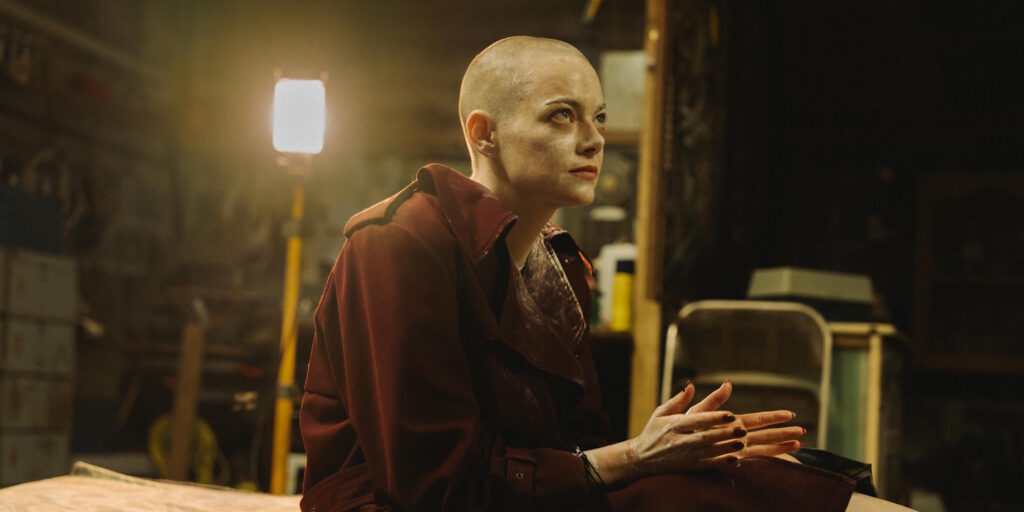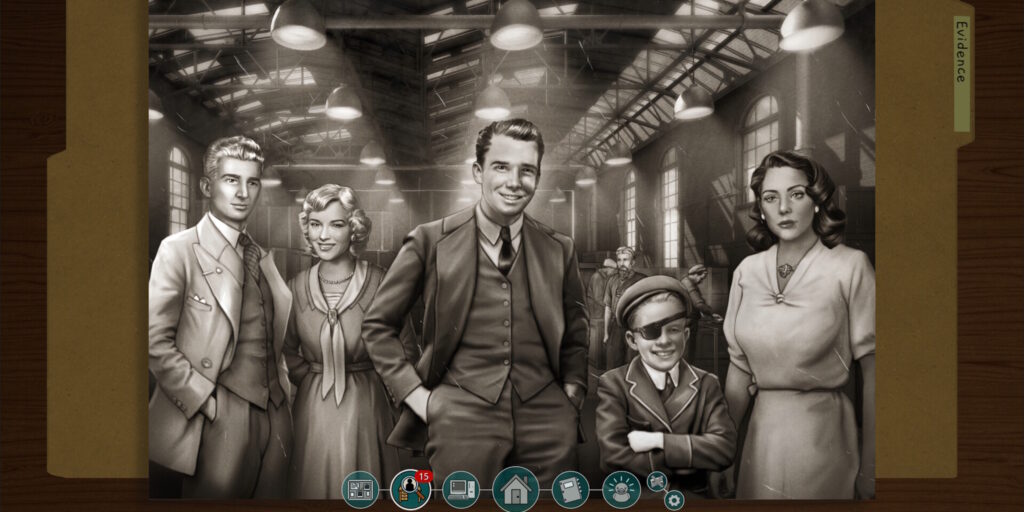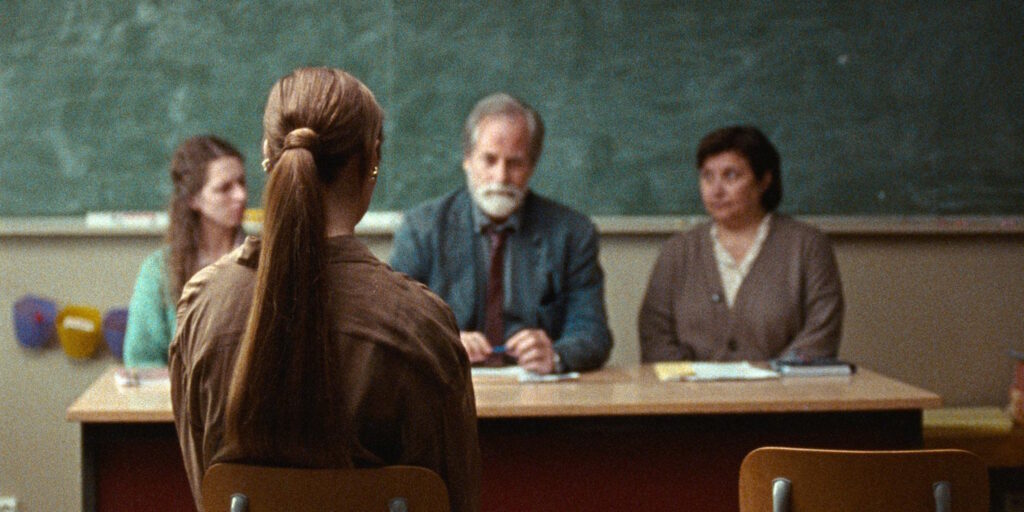Writer-director Aaron Schimberg’s A Different Man is a smart, morbid, and unexpectedly funny film, but it plays a bit of a long game, only gradually revealing all the cards up its sleeve. It begins with a slump-shouldered shell of a man named Edward (Sebastian Stan), who is afflicted with severe facial deformities due to a genetic condition. Notwithstanding his shocking appearance, Edward dreams of being an actor, although the only gig he has booked in recent memory consists of a couple of lines in a workplace-sensitivity video about (wait for it) … physical deformities and disfigurements. Edward shuffles to and from his outdated, leak-prone New York apartment, instinctively avoiding the gaze of everyone he passes. This is a man who’s learned to survive by making himself as small as possible, which is admittedly somewhat at odds with his thespian ambitions. Both Stan and Schimberg (Go Down Death, Chained for Life) do a tremendous job of wordlessly suggesting the soulfulness lurking behind Edward’s formidable social and psychological defenses. Anyone with a glimmer of humanity can see the depths of his pain – and the durability of his faintest hopes – in the one pale eye that is not occluded by his fleshy tumors.
Edward perks up a bit at the arrival of a new neighbor, a vivacious Norwegian beauty named Ingrid (Renate Reinsve) who also happens to be an aspiring playwright. Insistently friendly, she explores his apartment with curiosity and administers first aid to a recent injury with Nightingale-like tenderness. Her demeanor is so nonjudgmental that it unbalances Edward, who isn’t sure whether he’s suddenly the luckiest man alive or just the victim of a mean-spirited cosmic prank. This sensation is reinforced during an appointment with his regular physician, who coaxes Edward into participating in a new experimental treatment for his condition. He relents, more out of passive resignation than any genuine expectation that this cure will work, and soon he is being subjected to a battery of exams, scans, and injections in sterile white rooms.
Miraculously, however, it’s only a matter of days before clumps of tissue literally begin peeling away from his face, much to Edward’s shock and horror. This gruesome process swiftly accelerates until the man looking back in Edward’s bathroom mirror is unrecognizable: a square-jawed Adonis with piercing baby blues. (Not unlike … well, Sebastian Stan.) That very night, Edward takes his newly dreamy countenance for a spin around the neighborhood and receives a vivid lesson in pretty privilege, culminating in a bathroom blowjob from the sort of woman who just days before would have recoiled from him in revulsion. He soon decides to make a clean break with his old life, without so much as a goodbye to his doctors, neighbors, or even Ingrid. Faking his own death, he reemerges a year later as “Guy,” a real-estate hotshot with a tastefully modern apartment, a roster of hot fuck buddies, and a side gig as the Brooks Brothers face in his agency’s ads.
By chance, Guy stumbles onto a casting call for an off-Broadway play, only to discover that the writer and director is none other than Ingrid. What’s more, her play is about Edward – or at least loosely based on her self-serving, embroidered recollections of her brief interactions with Edward. Heightening the surrealism of the situation, Guy auditions for the starring role while wearing a mask molded from his old, deformed face. Ingrid, of course, adores his performance and promptly tumbles into bed with him. (Viewers might be waiting for the other shoe to drop, but Guy never reveals that he is, in fact, Edward, which is just one of the film’s pleasingly off-kilter narrative subversions.) On top of his already charmed life, the man formerly known as Edward now has the role of a lifetime and the girl of his dreams. And as the ancient Greeks have taught us, nothing unfortunate ever happens to people who get everything they want. Right?
This is admittedly a hefty chunk of plot, and it still only gets us about 45 minutes into A Different Man. However, one of the many impressive things about Schimburg’s feature is the efficiency and elegance of its storytelling, which manages to usher the viewer through all these events without feeling sweaty or overstuffed. The filmmaker also squeezes an astonishing amount of tonal variety into a relatively modest running time. The feature starts out as a miserabilist, Todd Solondz-esque character study, then shifts into a magical-realist ugly-duckling fable, while also maintaining the promise that some sinister comeuppance is looming, just itching to cut down Guy’s newfound hubris. Throughout, Schimburg manages to sneak in hat-tips to Woody Allen and Louis Malle, not to mention moments of both authentic pathos and farcical absurdism (such as a very New York bit about an ambulance and an ice-cream truck trying to pass one another on a narrow street).
At the same time, a credible argument could be made that A Different Man doesn’t truly reach its potential until it unveils its greatest, cruelest trick: Oswald. Viewers who are not familiar with British actor Adam Pearson – who has neurofibromatosis, resulting in the very facial deformities that once afflicted Edward – may be taken aback by his abrupt intrusion into the film. Even cinephiles who recall Pearson’s breakout role in Under the Skin (2013), however, will likely be unprepared for how thoroughly he upends the energy of Schimburg’s feature. Blowing into Guy’s story like a cockney whirlwind of Type A affability, wealthy wannabe actor Oswald (Pearson) wins over everyone around him with his confidence and effervescence. After popping in during rehearsals for Ingrid’s play, he soon becomes a fixture around the theater and (seemingly) everywhere Guy turns. Slowly and inexorably, Oswald begins to leech away Guy’s success: Elbowing him out of his starring role, charming Ingrid’s pants off, and undercutting Guy’s own self-assurance, all while being infuriatingly modest and amiable about it.
The film plays the Twilight Zone weirdness of this scenario completely straight, keeping the focus on Guy as he becomes utterly unglued at the perceived unfairness of Oswald’s very existence. It’s not the sort of film that breaks the fourth wall, but Stan spends most of the feature’s second half in silent, pleading commiseration with the viewer. (The actor’s hollow-eyed glares are superb at conveying a dazed “Can you fucking believe this shit?” energy.) Drawing on influences that range from the Coen Brothers to Frank Oz to Charlie Kaufman, Schimburg’s screenplay truly puts the screws to Guy, psychologically speaking, but the man’s escalating misfortunes carry a whiff of self-inflicted justice. Every indignity triggers an overreaction from him, which snowballs into yet more setbacks and blunders – and, eventually, into outright catastrophes. The result is a pitch-black farce that plays like a feature-length Jewish joke about the universe’s tendency to always balance the scales.
Yet the most striking thing about A Different Man is not its remorseless, Book of Job-like commitment to ruin its protagonist, but the patient and cunning way it plays with viewers’ assumptions. Schimberg’s screenplay tackles a host of notions surrounding sympathy, suffering, and the self, and in particular the discontinuities between how we see ourselves and how we are seen by others. Consider Ingrid, an uncommonly sweet and sincere girl-next-door who could never love a monster like Edward – or at least that’s what she resembles through the lens of his own toxic blend of self-pitying contempt and puppy-dog infatuation. Is Ingrid sweet and sincere, though? Take a step back and she starts to look like a bit of a narcissist, able and willing to manipulate others for her own creative purposes until they are no longer useful. (There is some fascinating and revealing psychology smuggled within a few throwaway lines from Edward, Ingrid, and Guy about a particular vintage typewriter.) This is characteristic of A Different Man’s sneaky intelligence, and the way it consistently reveals compelling layers beneath its already deft employment of indie-cinema tropes.
A Different Man opens in select theaters on Friday, Oct. 4.




